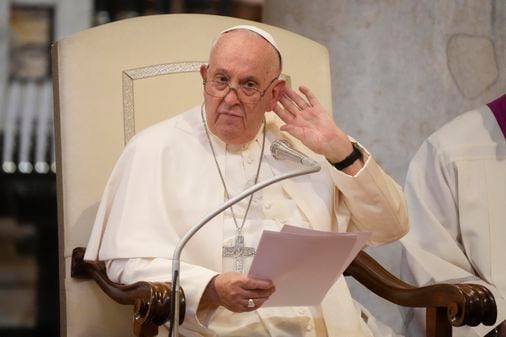Pope Francis won’t pick sides in today’s culture wars – The Boston Globe
His harshest critics, including American bishops such as former Bishop of Tyler Joseph Strickland, say his liberal views have encouraged not a loose Catholicism but a weakened faith. In 2013, he made headlines when he interrupted a Catholic conference on homosexuality saying, “If a person is gay and seeks Jehovah and has good intentions, ‘ Who am I to judge?”
Critics say such a gesture is a betrayal of his responsibility as the head of the church. His true obligations should be to defend the faith and resist the deviations of modern society. They say his leadership style is out of touch with the realities of practicing Catholics who want a pope who prioritizes Orthodox theology and traditional family rules.
At one time, I felt sorry for people who were criticized like that. Before I converted to Catholicism in 2019, I was wary of Pope Francis’ seemingly ongoing agenda.
Take for example the famous 2018 collaboration between the Holy Father and Emanuele, a Roman Italian boy whose atheist father had recently died. Emmanuel asked the pope if his father was in heaven. Surprisingly, Francis replied that “God does not abandon those who do good.” That was the firm response of the leader of the Catholic Church, who generally teaches that believing in Jesus is the key to happiness in the afterlife. Believers, including myself, found it very shocking that the pope would suggest that belief in God has nothing to do with one’s expectations of the afterlife. Like many other Catholics, I was disappointed.
However, from then on, I calmed down. What is the right thing to say to a grieving child – or anyone – looking for a glimmer of hope in a difficult situation?
Now I think that this pastor was on to something.
The 2018 exchange exemplifies the scope of Francis’ pontificate – to push the line between what is considered theology and what theology leaves open to interpretation. Francis’ commitment to tempering the doctrine of grace has allowed an unprecedented (albeit imperfect) access from the church to people who have long been excluded or excluded: the LGBTQ community, the poor and vulnerable, women, remarried people (the church does not accept divorce. , but it no longer excommunicates divorced and remarried people), disabled people, and non-Mak’ catholic.
Some of Francis’ champions, over the past 11 years, have interpreted his papacy as a harbinger of a coming revolution, a radical overthrow of Catholic tradition. Soon, they said, we will no longer exclude women from the clergy; we will remove restrictions on divorce and contraception; we can have new ideas about reproductive rights like abortion and many other controversial issues.
In recent years, most of these bubbles have burst, and the pope has gradually shown that only certain things should be debated in the church.
Earlier this year, in an interview with CBS news, he (again) appeared to reject the ordination of women, despite ongoing discussions in Rome and elsewhere. He recently used an offensive term in Italian to refer to homosexuality while suggesting that gay men should not be priests. He has never deviated from the issues of abortion or other issues of the right to life such as the death penalty (which the church also opposes). On the issue of divorce, he has not been silent since 2016, when he wrote a letter, “Amoris Laetitia,” which appeared to undermine the church’s ban on remarried Catholics receiving Holy Communion.
Finally, it is absurd to think that the church would accept such a fundamental change in its doctrine. Pope Francis’ record may end up discouraging liberal and conservative forces within the church, but as pope, he does not have the freedom to spark a radical change in Catholicism. It’s also his job to be moderate – so it’s a double bind: he’s not conservative enough to please conservatives, he’s not progressive enough to please liberals.
Simply put, Pope Francis has done many things right as the leader of the Catholic Church, and staying neutral in the culture wars is one of them.
As a former evangelical and social moderate, I appreciate his moderate embrace of modernity. For many in the church, the complete abolition of the basic tenets of Catholic teaching—an immutable moral code of life, normative norms of sexual behavior, male priesthood—would mean abandon their faith completely. However, the challenge of any religion, and especially an old one like the Catholic Church, is to believe what is the basis of faith and what is to adapt to the times.
Pope Francis seems to know the difference, even if his opponents do not.
Pope Francis has moved the needle to modern times, but he has not yet reached the Third Vatican Council (following the Second Vatican Council in 1962-65, which implemented reforms such as allowing services to be held in languages other than Latin and allowing priests to face their congregations during Mass). Instead, he has opened up a debate that is likely to repeat itself for decades to come. He made people think about joining the church or returning to the faith.
However, for me he has been the only pope I have known as a Catholic. A great man who wears his heart on his sleeve. A champion of culture and progress who did not set out to please everyone and sometimes angered everyone. Perhaps he brought exactly the type of awkwardness that the church needed.
Nate Tinner-Williams is the co-founder and editor of the Black Catholic Messenger and a graduate student in theology at Xavier University in Louisiana.
#Pope #Francis #wont #pick #sides #todays #culture #wars #Boston #Globe
